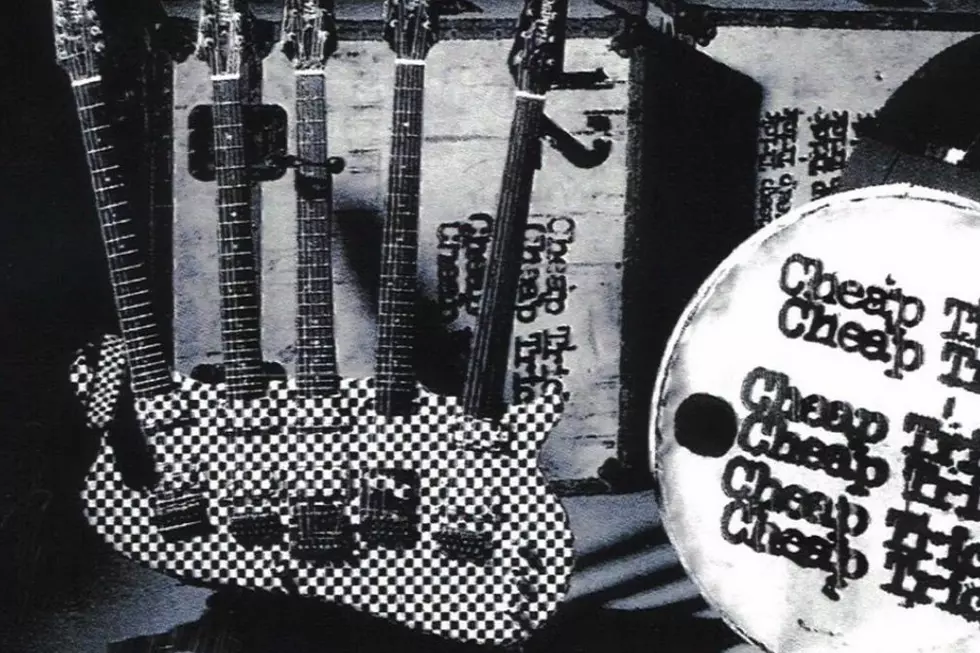
Why Cheap Trick Rebooted With a Self-Titled Indie Release
Better the devil you know, or so the saying goes — and after leaving their longtime label Epic following 1990's Busted LP, Cheap Trick received a firsthand lesson why.
Although Epic had certainly shown its share of patience with the band — and it had paid huge dividends on more than one occasion – by the end of the '80s, the differences between the two sides had become irreconcilable. The group enjoyed an unexpected commercial comeback with 1988's Lap of Luxury, but it took some passionate arguments over creative control, and when sales for Busted disappointed, the group jumped ship to Warner Bros.
"We were at Epic longer than any of their presidents," quipped guitarist Rick Nielsen in 1994. "We were hoping they'd put our names on a bathroom door, a mop closet door, something."
Lack of a commemorative restroom wasn't the real reason Cheap Trick parted ways with Epic — and the reportedly favorable terms of what was rumored to be a 10-album deal weren't the only things that lured the group to Warners. Calling their last few years with Epic "irritating" and "a strange time," Nielsen said the group had started to feel it was "headed in the wrong direction" creatively as well as professionally. "It was a falling out with the A&R people and a falling out with our manager," he added. "We were still good."
Unfortunately, that 10-record contract with Warners never had a chance to be completed — as has often been the case in the music industry, the executives responsible for putting together the deal ended up leaving the company not long after Cheap Trick came on board, and when fans failed to turn out for 1994's Woke Up With a Monster LP, the band was once again left without a label.
All of which explains how Cheap Trick found itself signing with Red Ant Entertainment, a new indie imprint with $100 million in funding and corporate stewardship courtesy of former MCA chairman Al Teller. One among a growing number of ambitious new record companies headed up by major-label exiles, Red Ant seemed like the perfect home for the band's next album — a back-to-basics set lacking the outside material that larded the band's late-period Epic releases as well as the glossy radio-ready sheen applied to portions of Woke Up With a Monster. Free from corporate interference, the band was able to make music on its own terms for the first time in years.
Listen to Cheap Trick Perform 'Anytime'
Appropriately, the end result — released April 29, 1997 — was a self-titled set whose stark black-and-white cover art deliberately harkened back to the band's eponymous 1977 debut. Working with Cheap Trick vet Ian Taylor as co-producer, the group delivered an 11-track set that restored the sneering, sawtoothed edge to Cheap Trick's sound — coupled with the knack for sticky melodies that had made them power pop heroes to generations of younger artists. With the band's influence more audible than ever in the mid-'90s mainstream, all Cheap Trick needed was the right push to put the band back in the spotlight.
Alas, it wasn't to be. While Red Ant readied the release of the Cheap Trick LP, the company faced a series of mounting legal difficulties and increasingly evident money problems. By July, the label was staring down an auction sale — one quickly halted by the courts in the midst of a messy legal nightmare that included a brief effort to purchase Red Ant by former multi-platinum rapper MC Hammer.
While the lawyers figured out how to divvy up Red Ant's assets, the company's roster withered on the vine — including Cheap Trick, who were left to try and promote a new album many fans couldn't even find in stores. During its brief two-week run on the charts, Cheap Trick rose no higher than No. 99 and quickly fell out of print, destined to spend years drifting through cutout bins and used CD shops before re-emerging in the digital era.
While the band continued touring, writing, and recording, their latest label debacle left them reluctant to release new music for years; they wouldn't return with their next LP until 2003.
"We were signed [to Warner Bros.] by Lenny Waronker and Mo Ostin, two of the biggest guys in the business. They got fired right as our record came out, so that was the kiss of death for us," Nielsen later explained. "Then our next record came out on Red Ant Records and they went bankrupt as soon as it came out. So we had two records with virtually no one hearing about it, unless you were a real diehard Cheap Trick fan. There was no push behind either one of them, so people were thinking we didn't put out records. We got a bit gun-shy; if we put out new stuff, nobody listened."
Top 100 Live Albums
More From Eagle 106.3










